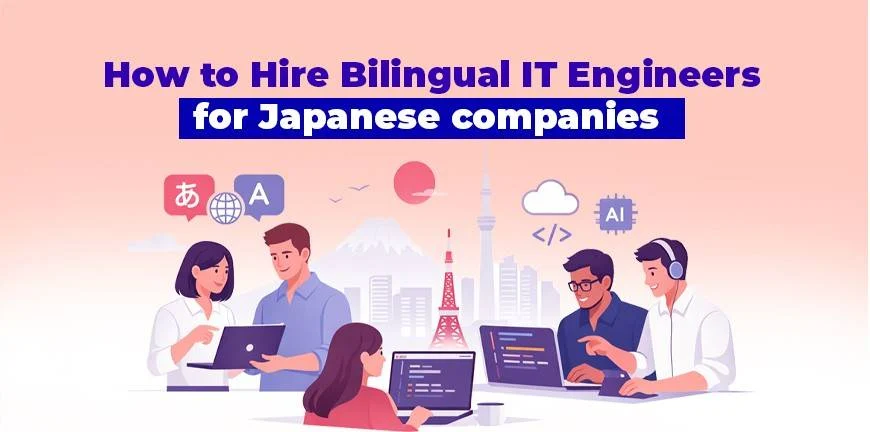
Top Job Roles in Green Manufacturing in 2025
10/01/2025
Top 11 RPO Trends to Watch in 2026
10/01/2025You may design the best user interface for your application and even optimize the designs further with the help of a UX designer, you will still need someone to code on the front end, or even if you are using no code someone to take charge of the front-end development. Hiring a front-end developer requires the recruiter to have patience and basic knowledge of how the full stack and particularly front-end development works.
What Is Front-end Development?
Front-end development is the process of coding in the navigational or aesthetic elements of an application or website that the users interact with. In other words, it is the front-facing or user-facing end of an application or a website. It typically consists of several graphical and navigational elements designed by UI and UX designers, which will then become a part of the app effectively by using front-end technologies.
What Does a Front-end Developer Do?
After you hire a front-end developer, he/she will manage the front-end development of an app. In this case, he will use frameworks on the front end such as VueJS, etc. To build the apps you want. He could work on a website as well. In such a case, he would use HTML, CSS, and JavaScript to build the user elements you interact with on a website.
What Are the Challenges of Hiring a Front-end Developer?
Front-end development is a highly rewarding job because it is so challenging for the recruit. Now, as a recruiter how do you find the right person to incorporate those navigational and aesthetic elements into an app?
Whether it is a button drop-down menu or even a flash screen with images, the right candidate must have coding knowledge in front-end development tools to make things work for the end customer.
All the promises you make during marketing and development using the back end are realized by the front end of an application and this is precisely its importance too. Here are some common challenges when hiring a front-end developer.
1. Finding Qualified Candidates Takes a Long Time
The front-end development route has shifted from more complex code to simpler code and then now to no code. It is always assumed that you will need some kind of programming knowledge for front-end development but a knowledge of no-code technologies as well. Finding someone with the requisite skills is a challenge.
Solution: Go beyond the regular search of looking for candidates with traditional qualifications such as only HTML, CSS, etc. or even newer frameworks such as Angular, React, and VueJS. You must conduct logical assessments and test their knowledge of how to use no-code platforms as well.
2. Competition for Top Talent Is Very High
With there being too many companies competing to hire front-end developers and there being very few candidates who differentiate themselves from the others, it can be difficult to hire good talent. And even if you do, how will you retain them when so many companies out there are vying for the talent?
Solution: You can differentiate your company, even if it is a small or medium-sized one with not too many employees. You can define your mission to be a more involving one, you can communicate the job as challenging and the benefits as extremely good for the job, possibly extended leaves and a good salary.
3. Assessing Technical Skills Can Be Difficult
This is another big challenge for hiring managers. The recruiter or junior recruiter will of course be unaware of the technical skills that a front-end developer must have. It is up to the hiring manager to give direction to the process. What do you do if you do not have the necessary technical skills?
Solution: Work with people from the development teams in your company and craft the right questions for the skill assessment. Make sure you run it with a third person to make sure that they are of the right difficulty for the specific position. You can also use platforms that allow you to design coding assessments easily. Conduct thorough screening not only in technical concepts but also in using real-world assessments and practical examples to differentiate the best from others.
4. Cultural Fit and Team Dynamics Can Be a Balancing Act
Ensuring that the members you bring into the team are a great cultural fit is something that will ensure that they stay on for a much longer tenure and collaborate well with other members of your team during that period, but this is not easy when you start hiring a freelance front-end developer.
Solution: Incorporate cultural and background assessments into your screening. Use psychometric testing if you must. Look for specific behaviors in the candidate and observe them during interviews. If the candidate is being hired for a senior position, how good are they at creating and maintaining meaningful work relationships at the workplace? Emphasize collaboration and teamwork in your company.
5. Remote Hiring is also a Challenge
While hiring remote or freelance front-end developers is advantageous in its way, it can be difficult to communicate with candidates from other countries, because they speak a different language and because they belong to a different time zone, which makes it difficult to reach them regularly.
Solution: You must make use of longer and clearer onboarding sessions where you use onboarding materials that document the company culture and how to conduct oneself at work. You can also use video conferencing and scheduling tools to connect with candidates who are being hired from offshore locations for interviews and possibly online time-bound assessments.
How to hire a front-end developer?
Before you hire a good front-end developer, decide on the business need and what front-end technologies you prefer. You can then set up the necessary infrastructure and back-end support in your company. You can then hire front-end developers proficient in the technologies you want. If you are not sure, you can create a job description for your front-end developer and share it with a recruitment agency. They will then connect you with the best front-end developers in the world.
Are You Looking for a Recruitment Agency?
An IT recruitment agency can help you hire the best front-end developers in very little time. Looking for a freelance front-end developer? They can help with that too! They will guide you throughout the recruitment process, standing by you through the most difficult stages, helping you craft the best job descriptions, shortlist the right candidates, and even negotiate that perfect salary for a position in the company. Alp Consulting, an IT recruitment agency of repute, has over 25 years of experience in recruitment and staffing. Let us know how we can help you.
FAQs
1. What is front-end development?
Front-end development is the process of coding the graphical user interface of an app, to enhance the user experience and guide the user through the intended path of the app. Front-end development is also referred to as client-side development for this reason.
2. What are some front-end technologies?
Basic front-end languages are HTML and CSS. Other advanced front technologies used by developers are Angular, ReactJS, and VueJS. When hiring a front-end developer, you would need to hire based on the skills you expect them to have.
3. Why do you need a front-end developer?
The first impression is the best. Behind just the aesthetics and the elements for navigation are the lines of front-end code that drive this impression for the end user. This is why front-end development is so important.
4. What is the difference between front-end and back-end development?
Front-end development is about developing the graphical user interfaces whereas back-end development is about writing the server-side code that makes the functions promised on the front end possible.
5. What is the difference between front-end and full-stack development?
Front-end development is about coding the user-facing parts of an app and full-stack development is all about writing the client-side and the server-side code and ensuring that the app works as expected. Fullstack developers are essentially custodians of app development.
Contact Us For Business Enquiry

Amit Saproo
Amit Saproo is the Head of Operations at ALP Consulting with nearly 17 years of experience in Executive Search, RPO, Leadership, and IT & Engineering recruitment. He leads nationwide recruitment programs across Technology, BFSI, and R&D domains, driving strategic hiring solutions for diverse client needs. Amit excels in building and managing high-performance teams that deliver scalable, end-to-end recruitment and consulting services.




